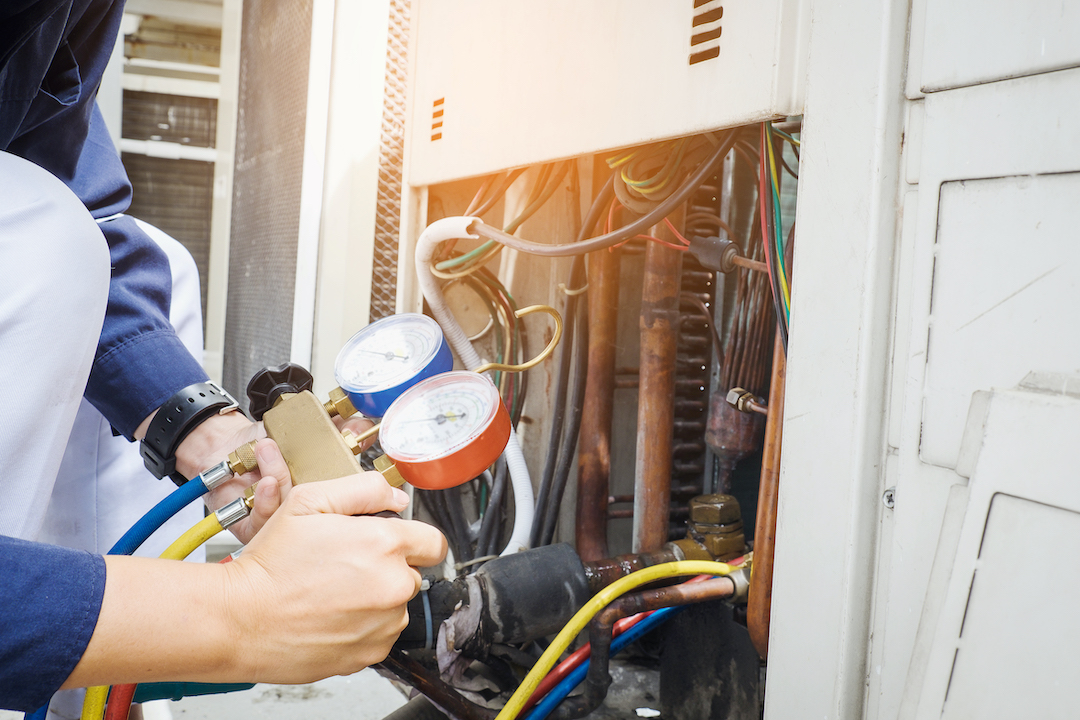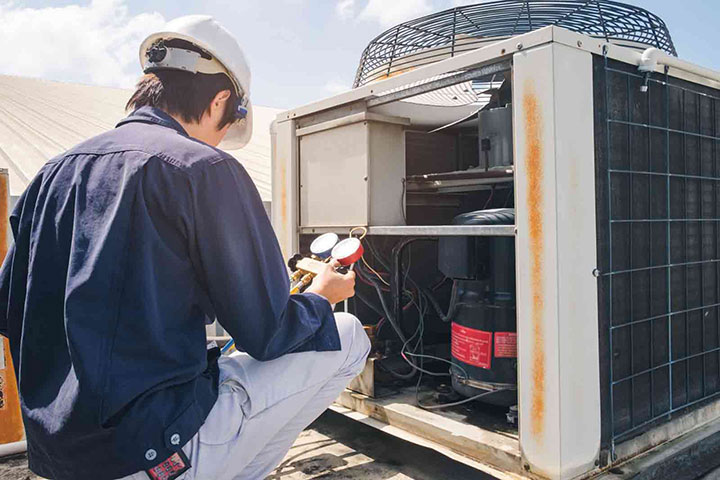How to Save on Your furnace replacement Project
How to Save on Your furnace replacement Project
Blog Article
Picking Between a Warm Pump and Furnace: Secret Factors To Consider for Your A/c Requirements
When reviewing home heating choices for heating and cooling needs, the decision in between a heatpump and a heating system can be intricate. Each system uses distinct advantages customized to particular climates and power effectiveness goals. Recognizing these differences is vital for making an educated selection. Secret aspects such as setup expenses and ecological effect better complicate the option procedure. Which choice truly lines up with one's convenience and sustainability preferences? The complying with areas will explore these considerations thoroughly.
Recognizing Warm Pumps: How They Function and Their Advantages
While many house owners think about various home heating alternatives, comprehending how heatpump feature and their advantages can greatly influence their choice. Heat pumps operate by moving heat instead of generating it. In the wintertime, they extract warm from the outdoors air or ground and move it inside your home, while in the summer season, they reverse this process, cooling the home by eliminating warm outside. This double capability makes them flexible for year-round environment control.One of the key benefits of warm pumps is their energy performance. They utilize significantly much less electrical power compared to typical home heating systems, possibly causing reduced utility bills (heat pump installation ooltewah tn). Furthermore, heatpump have a smaller sized carbon footprint, making them an environmentally friendly selection. They additionally need less maintenance than standard systems, adding to long-term cost savings. Overall, comprehending the technicians and benefits of warmth pumps can aid property owners make informed decisions regarding their heating and cooling demands
Exploring Heaters: Types, Procedure, and Advantages
Heating systems come in numerous kinds, including gas, electric, and oil models, each with distinct operational devices. Comprehending these differences is crucial, as they influence performance and heating efficiency. Furthermore, heating systems supply numerous advantages, such as regular warm output and reliability in chillier environments.
Sorts of Heating systems
Home heating systems can vary significantly in style and operation, with heaters being a preferred choice amongst house owners. There are numerous kinds of heating systems, each making use of different gas sources and technologies. Gas furnaces prevail, leveraging natural gas to produce warm effectively. Electric furnaces, on the various other hand, make use of electrical resistance to produce heat, usually preferred for their straightforward installment. Oil heating systems, while less typical, are effective in locations with limited gas accessibility (heat pump installation ooltewah tn). Additionally, condensing heaters take full advantage of energy efficiency by recording and reusing exhaust gases. Each type runs through a system of warmth exchangers and ductwork to distribute warm air throughout a home. Recognizing the differences in between these heating system types is crucial for informed a/c decisions
Advantages of Heating systems
For home owners looking for dependable warmth throughout cool months, the advantages of heating systems are substantial. Heating systems provide constant home heating, making sure also temperatures throughout the home. They are especially reliable in severe cold, usually outshining heatpump in frigid conditions. Different kinds, including gas, electric, and oil heaters, provide flexibility to satisfy varied requirements and preferences.Furnaces also have a tendency to have reduced preliminary installment expenses contrasted to heatpump, making them a much more obtainable choice for several. Their robust layout contributes to a much longer lifespan, with many devices lasting over 15 years with appropriate maintenance. Additionally, modern heating systems are often furnished with sophisticated innovation for enhanced effectiveness, which can lead to minimized energy bills. In general, heating systems stay a reputable option for reliable home heating.

Energy Effectiveness: Contrasting Warmth Pumps and Furnaces
When contrasting power efficiency in between warmth pumps and heating systems, the Seasonal Power Efficiency Ratio (SEER) plays an essential function in establishing performance. Additionally, an operational price analysis exposes the lasting monetary implications of each system. Recognizing these elements can direct property owners in making informed decisions concerning their heating options.
Seasonal Power Effectiveness Ratio
Power efficiency plays a vital role in the decision-making procedure between heatpump and heaters, particularly when taking into consideration the Seasonal Energy Efficiency Ratio (SEER) This statistics steps the cooling performance of heatpump over a whole air conditioning season, supplying a standard method to examine performance. Greater SEER scores suggest better power performance, equating to reduced power intake and lowered energy costs. In contrast, furnaces are commonly evaluated utilizing the Yearly Fuel Application Efficiency (AFUE) score, which reflects home heating effectiveness. When comparing these 2 systems, home owners should focus on SEER scores for heat pumps, as they straight influence overall energy cost savings and ecological sustainability. A complete understanding of SEER can significantly affect the long-term fulfillment and cost-effectiveness of the picked cooling and heating option.
Operational Expense Evaluation
Recognizing the operational expenses connected with heatpump and heating systems is crucial for house owners assessing their choices. Heatpump typically supply greater power efficiency, transforming electric energy into warmth with marginal waste. This leads to reduced month-to-month energy expenses, particularly in modest climates. On the other hand, traditional furnaces, especially gas versions, might have reduced ahead of time expenses but can incur greater functional expenditures with time because of sustain costs and efficiency ratings.Moreover, warm pumps can work as both heating and cooling down systems, potentially decreasing the need for separate HVAC units. While initial financial investments for heatpump may be greater, their long-lasting savings in energy performance can make them a much more economical selection for several houses. Cautious analysis of neighborhood energy rates is necessary to identify the finest choice.
Installation Costs: What to Anticipate for each and every Heating System
Installment expenses for furnace can vary significantly between heat pumps and heating systems, influencing house owners' choices. Heatpump usually have higher in advance setup costs, typically ranging from $3,500 to $8,000, depending upon the system dimension and intricacy of installment. This includes the exterior system, indoor handling system, and needed ductwork adjustments. Conversely, heating systems tend to have lower preliminary expenses, balancing in between $2,500 and $6,000, which can be appealing for budget-conscious property owners. However, installment expenditures can raise if extensive ductwork is required.Moreover, the choice of fuel type for heaters-- gas, lp, or electrical-- can likewise impact installment costs. While heatpump supply energy efficiency, their initial financial investment might discourage some buyers. Ultimately, evaluating installment costs together with long-lasting savings and efficiency will assist property owners in making informed choices regarding their home heating systems.
Environment Factors To Consider: Which System Does Better in Your Location
Exactly how do climate problems affect the performance of furnace? The efficiency of heat pumps and heating systems can visit differ greatly relying on the neighborhood environment. In modest climates, heatpump succeed by effectively moving warmth from the outdoors air, making them an energy-saving alternative. Their effectiveness diminishes in very cold temperature levels, where they might have a hard time to draw out enough warmth. Alternatively, heating systems, particularly gas models, offer consistent and dependable heat no matter outside problems, making them better in colder regions.In areas that experience milder wintertimes, warm pumps can run properly year-round, supplying both heating & cooling. On the other hand, areas with harsh winter seasons often profit from the robustness of heaters. Inevitably, recognizing the regional environment why not look here is essential when making a decision in between a heat pump and a heater, as it straight impacts their functional effectiveness and general performance.
Upkeep Needs: Long-Term Take Care Of Heat Pumps vs. Furnaces
While both heatpump and heating systems call for normal upkeep to ensure peak performance, their particular demands and care routines differ substantially. Furnaces commonly require much less frequent focus, with annual evaluations being adequate to look for gas leaks, clean filters, and evaluate overall performance. Their easier style commonly allows for straightforward repairs.In comparison, heat pumps demand semiannual maintenance as a result of their double duty in cooling and heating. This includes cleansing coils, inspecting refrigerant degrees, and ensuring that both the interior and outside units operate at their best. In addition, heatpump upkeep commonly involves even more elaborate components, making specialist maintenance essential.Neglecting maintenance can bring about diminished efficiency and boosted power prices for both systems. Eventually, homeowners should take into consideration these long-lasting care needs when picking between a heatpump and a heating system, as positive upkeep can prolong the life expectancy and efficiency of either system substantially.
Environmental Influence: Selecting a Sustainable Home Heating Choice
The ecological effect of home heating systems is a crucial analysis for house owners looking for lasting options. Heatpump are typically much more energy-efficient than conventional furnaces, as they move heat instead than generate it, substantially minimizing carbon emissions. By making use of renewable resource sources, such as geothermal or air-source warmth pumps, homeowners can even more minimize their environmental footprint.On the other hand, gas heaters give off greenhouse gases and add to air pollution, though they typically offer greater heat result. Nevertheless, innovations in technology have actually brought about the growth of high-efficiency heating systems that minimize emissions.Ultimately, picking a heating unit includes evaluating effectiveness against environmental impact. Property owners are motivated to review local power sources and incentives for sustainable systems, making certain a selection that aligns with both individual comfort and ecological duty. The choice influences not just instant convenience but additionally long-lasting sustainability and environmental health and wellness.
Frequently Asked Questions
How Much Time Do Warm Pumps and Furnaces Normally Last?
The lifespan of heatpump normally ranges from 15 to twenty years, while heaters can last between 15 to three decades. Routine maintenance substantially influences their long life and effectiveness in supplying home heating solutions.
Can I Make Use Of a Heatpump in Exceptionally Cold Climates?
Heatpump can operate in incredibly cool climates, however their efficiency lessens as temperatures decline. In such conditions, supplemental heating resources might be essential to maintain comfy indoor temperatures and guarantee peak performance.

What Is the Sound Degree of Heat Pumps Versus Furnaces?
The noise degrees of heatpump and heaters vary significantly. Generally, heatpump run more quietly than typical heaters, making them better for those conscious seem, while heaters may generate louder functional noises throughout heating cycles.
Are Heat Pumps Suitable for Both Heating and Air conditioning?
Warmth pumps are without a doubt ideal for both heating and cooling (furnace replacement). They operate by transferring warmth, offering reliable temperature level control year-round, making them a functional selection for property owners seeking an all-in-one a/c solution
What Dimension Furnace Do I Need for My Home?
Figuring out the proper dimension heating unit for a home calls for examining factors such as square video, insulation top quality, regional environment, and the home's layout. Consulting a professional can assure an exact analysis navigate to these guys and optimal convenience. Warmth pumps normally offer greater energy performance, transforming electrical power into warmth with minimal waste. In modest environments, heat pumps excel by efficiently moving warmth from the outside air, making them an energy-saving option. Alternatively, furnaces, especially gas versions, provide consistent and dependable warm regardless of exterior problems, making them better in cooler regions.In locations that experience milder winter seasons, warmth pumps can operate successfully year-round, providing both home heating and cooling. Heat pumps are typically extra energy-efficient than traditional heaters, as they transfer warmth rather than generate it, significantly reducing carbon discharges. By making use of eco-friendly energy sources, such as air-source or geothermal warmth pumps, house owners can further decrease their ecological footprint.On the other hand, natural gas heaters release greenhouse gases and contribute to air pollution, though they usually give greater warmth result.
Report this page